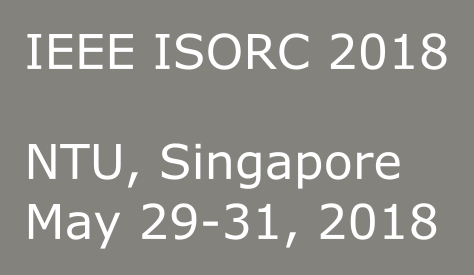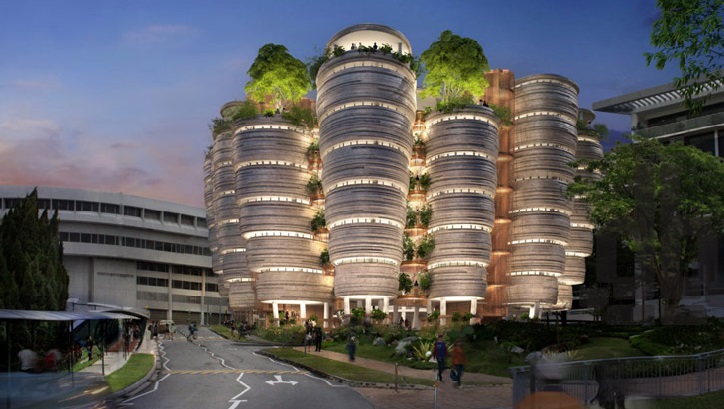IEEE ISORC 2018 PROGRAM
TUESDAY, MAY 29th
| 08:00 – 08:45 | Registration |
| 08:45 – 09:00 | Welcome to ISORC 2018 |
| 09:00 – 10:00 | Keynote 1: From Timing and Energy Analysis to Testing by
Abhik Roychoudhury Chair: Arvind Easwaran |
| 10:00 – 10:30 | Coffee Break |
| 10:30 – 12:30 | Session 1: Execution-Time Predictability Chair: Oleg Sokolsky |
| Task-Allocation in a large scaled hierarchical many-core topology Andreas Lund and Uwe Brinkschulte |
|
| Hardlock: a Concurrent Real-Time Multicore Locking Unit Tórur Biskopstø Strøm and Martin Schoeberl |
|
| Mixed-Criticality Scheduling on Multiprocessors with Service Guarantees Saravanan Ramanthan and Arvind Easwaran |
|
| Scalable and Memory-Efficient Spin Locks for Embedded Tile-based Many-core Architectures Shinichi Awamoto, Hiroyuki Chishiro and Shinpei Kato |
|
| 12:30 – 13:30 | Lunch |
| 13:30 – 15:30 | Session 2: Designing Real-Time Systems Chair: Martin Schoeberl |
| CLAIR: A Contract-based Framework for Developing Resilient CPS Architectures Sidharta Andalam, Daniel Jun Xian Ng, Arvind Easwaran and Karthikeyan Thangamariappan |
|
| QuaRTOS-DSE : a Tool for Design Space Exploration of Embedded Real-Time System Briag Le Nabec, Belgacem Ben Hedia and Jean-Philippe Babau |
|
| Generic Formal Framework for Compositional Analysis of Hierarchical Scheduling Systems Jalil Boudjadar, Jin Hyun Kim, Linh Thi Xuan Phan, Insup Lee, Kim Larsen and Ulrik Nyman |
|
| An Approach to Formalization of Architectural Viewpoints Design in Real-Time and Embedded Domain Fabíola Gonçalves Ribeiro, Achim Rettberg, Carlos Pereira, Charles Steinmetz and Michel Soares |
|
| 15:30 – 16:00 | Coffee Break |
| 16:00 – 17:00 | Session 3: Timing Predictability Chair: Qixin Wang |
| Faster Function Blocks for Precision Timed Industrial Automation Hammond Pearce, Partha Roop, Morteza Biglari-Abhari and Martin Schoeberl |
|
| tpIP: a Time-predictable TCP/IP Stack for Cyber-Physical Systems Martin Schoeberl and Rasmus Ulslev Pedersen |
WEDNESDAY MAY 30th
| 09:00 – 10:00 | Keynote 2: Towards Assurance-based Learning-enabled Cyber-Physical Systems by Gabor Karsai Chair: Abhishek Dubey |
| 10:00 – 10:30 | Coffee Break |
| 10:30 – 12:20 | Session 4: Emerging Trends in Distributed Object Computing Chair: Gabor Karsai |
| IoT Data Integrity Verification for Cyber-Physical Systems using Blockchain Caciano Machado and Antônio Augusto Fröhlich |
|
| A Data Stream Processing Optimisation Framework for Edge Computing Applications Gayashan Amarasinghe, Marcos D. de Assunção, Aaron Harwood and Shanika Karunasekera |
|
| Data Freshness Over-Engineering: Formulation and Results Dagaen Golomb, Deepak Gangadharan, Sanjian Chen, Oleg Sokolsky and Insup Lee |
|
| An edge computing architecture in the Internet of Things Short paper: Cristian Martín, Manuel Díaz and Bartolomé Rubio |
|
| 12:20 – 13:15 | Lunch |
| 13:15 – 15:15 | Session 5a: Safety and Performance Assessment Chair: Uwe Brinkschulte |
| Cost-Effective Redundancy Approach for Fail-Operational Autonomous Driving System Tasuku Ishigooka, Shinya Honda and Hiroaki Takada |
|
| A Self-Reconfiguring Cache Architecture to Improve Control Quality in Cyber Physical Systems Mohammad Shihabul Haque, Sriram Vasudevan, Sriram Nihar, Arvind Easwaran, Akash Kumar and Y.C. Tay |
|
| Representative Safety Assessment of Unmanned Autonomous Vehicle for Public Transportation Short Paper: Morayo Adedjouma, Gabriel Pedroza and Boutheina Bannour |
|
| Intrusion-Tolerant Autonomous Driving Short Paper: Marcus Völp and Paulo Esteves-Verissimo |
|
| Rethinking the Validation Process for Medical Devices: A Cardiac Pacemaker Case Study Short Paper: Sidharta Andalam, Partha Roop, Avinash Malik and Mark Trew |
|
| 15:15 – 15:45 | Coffee Break |
| 15:45 – 16:30 | Session 5b: Safety and Performance Assessment Chair: Arvind Easwaran |
| Introducing Automatic Time Stamping (ATS) with a Reference Implementation in Swift Short Paper: Sean Hamilton, Dhiman Sengupta and Rajesh Gupta |
|
| Detecting Single Event Upsets in Embedded Software Short Paper: Robert Pettit and Aedan Pettit |
|
| 16:30 – 17:30 | Panel: Emerging Applications, Challenges and Opportunities in Seamless Computing Across Edge, Fog and Cloud Chair: Abhishek Dubey & Sidharta Andalam Topics: 1. What are the next challenges for real-time computing. Are traditional approaches focused on scheduling guarantees still relevant in this new paradigm of seamless computing in our communities? 2. The integration of AI and CPS: How do we trust the AI? Can we verify the inferences made by Machine Learning black-boxes integrated in the modern cyber-physical systems? |
| 19:00 onwards | Dinner Banquet (Privé, Asian Civilizations Museum) |
THURSDAY MAY 31th
| 09:00 – 09:40 | Session 6: Applications Chair: Sidharta Andalam |
| IoT Integration for Adaptive Manufacturing Short Paper: Christos Alexakos, Christos Anagnostopoulos, Apostolos Fournaris, Christos Koulamas and Athanasios Kalogeras |
|
| Zigbee Based Wireless Data Acquisition System for Underground Mines – A Feasibility Study Short Paper: Amit Swain, Mahesh Bepari, Nimish Patnaik and Himanshu Bhushan Sahu |
|
| 09:40 – 10:10 | Session 7: Execution Time Predictability (2) Chair: Sidharta Andalam |
| SITSA-RT: An Information Theory Inspired Real-Time Multiprocessor Scheduler Carlos Rincón and Albert Cheng |
|
| 10:10 – 10:30 | Coffee Break |
| 10:30 – 11:50 | Session 8: Emerging Concepts Chair: Abhishek Dubey |
| Design and Analysis for Dual Priority Scheduling Xiaozhe Gu, Arvind Easwaran and Risat Pathan |
|
| Real-Time ROS Extension on Transparent CPU/GPU Coordination Mechanism Yuhei Suzuki, Takuya Azumi, Shinpei Kato and Nobuhiko Nishio |
|
| OpenICE-lite: Towards a Connectivity Platform for the Internet of Medical Things Short paper: Radoslav Ivanov, Hung Nguyen, James Weimer, Oleg Sokolsky and Insup Lee |
|
| 11:50 – 12:45 | Lunch |
| 12:45 – 14:15 | Excursion: Depart from NEC to CETRAN, Centre of Excellence for Testing & Research of AVs. Demonstration of Navya ARMA autonomous vehicle in the test track. |
| 14:15 – 18:30 | Excursion: to NEWater supply plant (back at NEC by 18:30) or Model factory at SIMTech (back at NEC by 17:30). |
| 18:30 | End of Conference |



